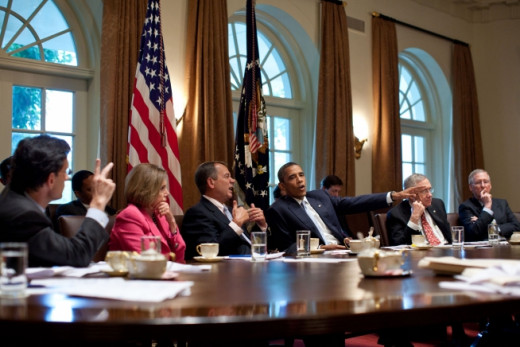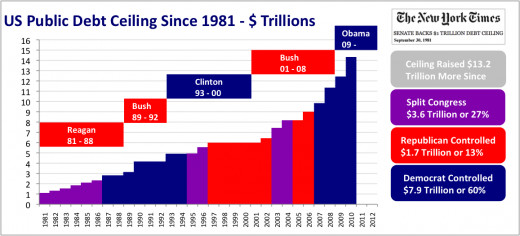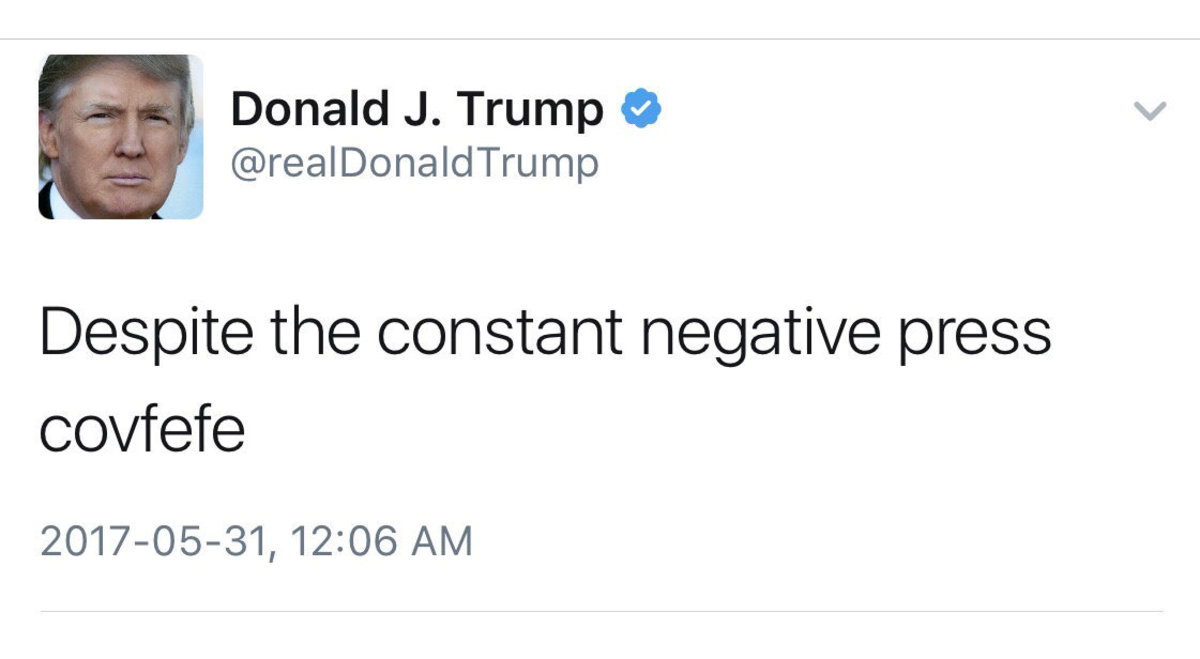Why Republicans Are Wrong - Debt Ceiling Edition
Today class, we will discussing the debt ceiling. Not to tip my hand... but the Republicans are wrong and the debt ceiling itself is dumb.


Politics
I give the people what they want, so here's how this ends; Republicans cave on their demands of draconian dollar-for-dollar cuts to Medicare and Social Security for raising the debt ceiling. Business leaders will descend upon DC and gently nudge Speaker John Boehner to forgo the Hastert rule, ignore the extremists in his own caucus, and make a deal with Democrats to push the debt ceiling off for up to two years. Why?
Well because they still have the sequester and continuing resolution as leverage coming up in the near future on those issues Republicans may not feel the brunt of the blame as with the debt ceiling.
President Obama has said repeatedly that he will no longer negotiate over threat of the debt ceiling. Members of the GOP are threatening to risk the full faith and credit of the nation unless they get the cuts they want.
President Obama is certainly reticent to risk harm to the economy, but he is dealing with people in Congress who have no incentive to be reasonable. Gerrymandered districts mean that GOP House members are only threatened from their extreme flank, so being cooperative is considered a betrayal. Many Tea Partiers were sent to Washington to be obstructionists, because they don't believe in government as a principle.
However, Obama knows full well that the Republicans shoulder the blame if the debt ceiling negotiations go bad. And for good reason - they are being children. The GOP is threatening the full faith and credit of the United States in a game of political chicken for partisan gain.
*Update - Republicans cave on their demands for cuts, pass No Budget, No Pay to suspend debt-ceiling until May 19.

What's a Debt Ceiling?
It's like if hypothetically we used our collective credit card to buy a computer that we've been using, and will continue to use in the near future (that's the budget). So now the credit card bill comes in the mail (that's the debt ceiling). So, are choice now is whether to ignore the credit card bill and purposely harm our credit rating, just for kicks - or we can choose to pay our bills for the stuff we already bought, like actual adult human beings. In other words...
The Second Liberty Bond Act was enacted in 1917. It instructed Congress to take a second vote in order to raise the "debt ceiling" in addition to the vote passing the federal budget. The original debt ceiling was set at $11.5 billion, and today sits at $16.4 trillion.
Now why on earth would we break it into two separate steps? Good question. And I don't know the answer, it's beyond reason. Perhaps the Senate was just too darned functional and they needed yet another way to throw a wrench in things? Maybe the Senate wanted leverage on the House?
Article 1, Section 7 of the Constitution - All bills for raising Revenue shall originate in the House of Representatives; but the Senate may propose or concur with Amendments as on other Bills.
In fairness to today's GOP, Senate Majority Leader Harry Reid (D) has refused to allow votes on the Senate floor on any of President Obama's annual federal budgets. Instead we've adopted continuing resolutions, and the GOP is equally to blame for passing those. I digress...
As the Government Accountability Office clearly explains, "the debt limit does not control or limit the ability of the federal government to run deficits or incur obligations. Rather, it is a limit on the ability to pay obligations already incurred."

Gephardt Rule
In 1979, Dick Gephardt (D) was delegated by Speaker Tip O'Neil to whip up votes for passage of the debt ceiling, and Gephardt had the grand idea of eliminated the unnecessary second vote, and marrying the passage of the federal budget to the raising of the debt ceiling when the budget demanded such.
"I'd say to members, 'Did you vote for the appropriations bill? The defense bill? The highway bill?' They'd all say yes. And I'd say, 'Well, then you gotta pay the bill. If you didn't mean it, don't vote for it. Then you wont have to pay for it.'" - Gephardt recalled.

Saint Reagan
With the Gephardt rule in effect, budgets signed by President Ronald Reagan demanded raising of the debt ceiling 18 times. In fact, under Reagan the national debt was nearly tripled. In the 191 years prior to Reagan, our national debt had amounted to a whole $900+ billion - by the time Reagan was through, the national debt was roughly $2.7 trillion.
We could talk about supply-side trickle-down Reaganomics and the Laffer curve, lowering the top tax rate from 70% to 28%; or we could discuss defense spending and the military industrial complex, American imperialism and empire building...
Instead we will focus on the debt ceiling itself, and President Reagan warning Republicans against playing politics with the debt ceiling in his radio address in September 1987. While he may also have warned against increased spending, the fact remains that Reagan had no apparent qualms with raising the debt ceiling 18 times.
Also, Reagan was incorrect in his assumption about the effect of shutdown on inflation, as we would learn eight years later...

Shutdown
And so it was that budgets were passed through Congresses and signed by Presidents, and yes, the national debt rose as those budgets demanded. Until one fateful day in 1995...
Newt Gingrich was Speaker of the House, and he saw President Bill Clinton's budget as anathema, predicting Clinton's proposed tax increases would destroy the economy and explode the national debt. History has proven Speaker Gingrich painfully wrong of course on the merits of his argument, but he chose at the time to send a budget to Clinton that he did not deem acceptable. So Clinton vetoed Newt's budget, and Newt wouldn't back down, so rather than increase the debt ceiling, Newt chose to shut down the government instead. The Gephardt rule was no more. Exactly the actions that Reagan had warned against eight years prior.
Of course, Republicans were blamed en mass... Newt was disgraced and tossed out amid ethics allegations and possible $300,000 in fines. Only to reemerge with a new healthy wife, and as a huckster of books and awards, a political profiteer if there ever was one.

Debt Ceiling Debacle
In 2011, Republicans were reticent to raise the debt ceiling under President Obama, even though they had done so seven times under George W. Bush. The GOP leadership was of the mind that they could use the debt ceiling as a negotiating chip in order to extract dramatic budgetary cuts from the president.
Speaker Boehner had gotten Obama to offer up cuts to sacred cows Social Security and Medicare as terms to a grand bargain. But Boehner could not negotiate in good faith with Obama since he could not deliver the votes of Majority Leader Eric Cantor, Paul Ryan, Majority Whip McCarthy, and the like from the Tea Party. They believed that they would be negotiating with a President Romney in 2013. So Speaker Boehner decided to walk away from negotiations rather than make promises he could not keep to the president.
The result? Republican's were widely blamed once again, Moody's lowered our nation's credit rating, and Congressional approval rating fell from a high of 84% in October of 2001 down to an abysmal approval rating of 9% in October of 2011. This being lower than the approval ratings for a communist takeover of America, lower than BP during the Deepwater oil spill, polygamy, or Paris Hilton.
The Supercommittee was formed (later the gang of six), and tasked with negotiating a basic agreement on outlines for a budget. They failed of course, and so the Budget Control Act wound up being passed, which set up the fiscal cliff disaster for 2013.
Once again, the can was kicked down the proverbial road for two additional months, and so here we are today debating the debt ceiling...again.

"I Will Not Negotiate Over the Debt Ceiling"
For what it's worth, President Obama recently offered to take the debt ceiling off of the table indefinitely as part of grand bargain negotiations. This would make a whole lot of sense, and has exactly zero chance of happening as it stands now, however.
In fact and to his credit, Obama has repeatedly stated that he will not, under any uncertain terms, negotiate over the fiscal cliff.
Options
These people need to do their jobs and come together and make a deal, short of that...
The platinum coin option would consist of printing a trillion dollar coin to cover the debt. Section (k) of 31 USC § 5112 allows the Secretary of the Treasury to print coins of a chosen denomination. This seems like an intriguing, though ultimately distasteful, option. No wonder Tim Geithner has announced he is on his way out of dodge. Viva Krugman!
Much more palatable is the 14th Amendment route whereby President Obama unilaterally raises the debt ceiling without considering the consent of Congress;
Section 4. The validity of the public debt of the United States, authorized by law, including debts incurred for payment of pensions and bounties for services in suppressing insurrection or rebellion, shall not be questioned...
While either of these bizarre solutions would end up in the Supreme Court, Obama is in the position of either breaking the law by not honoring our debts, or breaking the law to honor our debts. And these bizarre solutions are no more bizarre than holding the economy hostage over the debt ceiling.
And then there is the McConnell option, where the president raises the debt ceiling after a series of votes my Congress.
For Obama's part, he used the balance of his political capital in order to pass Obamacare in his first term. Stands to reason that we would see how that works out before we go about gutting benefits for seniors, as GOP leadership is demanding. After all, exploding healthcare costs are inflating budgets, not the Medicare program itself. Medicare inflation is lower than private insurance inflation because the program works. In fact, Medicare insolvency projections have averaged around 12 years - as they are now- going back 40 years.

Grand Bargain
Republicans want to negotiate a grand bargain over sequestration and entitlement reform and corporate welfare & tax reform & infrastructure & energy? Outstanding, let's do that, it should have been done long ago.
- Tax capital gains and dividends at the same rates as other income
- Raise the payroll tax cap to $400k for Social Security
- Allow Medicare to negotiate prescription drug prices with pharmaceutical companies
- Fundamentally shift more healthcare systems from fee-for-service to results-based compensation that encourages proactive care
- Fix malpractice insurance and lawsuits
- Bring back job training programs to supplement Unemployment Insurance
- Fund more Pell Grants and persuade colleges to slow the rising cost of an education.
- Keep interest rates low for student loans, and tie those rates to income level
- Make it easier to fire bad teachers, and compensate the good ones well
- Eliminate nonessential and costly weapons programs like the M1 Abrams tank, the B2 Spirit, and the amphibious Expeditionary Fighting Vehicle
- Slash the nuclear weapons budget
- Bring troops home from Afghanistan. We don't need 30,000 boots in Korea, or 35,000 in Japan, or 50,000 in Germany
- Eliminate tax breaks for private jet owners and tax credits for moving jobs overseas.
- Retrofit buildings to be more energy efficient
- More wind turbines.
- If energy companies get subsidies, then make them invest those in research and development of green energy and a more efficient, and national, power grid
- Fix our crumbling roads & bridges & highways
- Update our outdated nuclear facilities.
- Shift corporate welfare away from Big Agri for their corn and soy and...
- Toward refrigeration and such for smaller farms that grow healthier foods on a more local level.


"We Don't Have a Revenue Problem, We Have a Spending Problem"
As it stands now, Republicans are saying that the only way they will vote to raise the debt ceiling is if there are dollar for dollar budget cuts. Even though this is a debt ceiling trilogy, and Republicans won the first round in 2011. They claim that since they lost the fiscal cliff negotiations and already agreed to tax hikes, that no more revenue can be raised and that the tax issue is - as Senate Minority Leader Mitch McConnell said - "off the table".
Strange, given that taxes consist of only 15% GDP and only 9% of personal yearly incomes, both the lowest in 60 years. Stranger still, given the laughable conservative mantra pushed by President George W. Bush that "tax cuts pay for themselves" (although H.W. Bush debunked this theory as Voodoo Economics way back in 1980).
While it seems pretty pathetic that certain politicians would risk the full faith and credit of the United States by taking the world's economy hostage, all in a nakedly partisan ploy for imposing political demands, some members of the GOP seems to relish the prospect...
As it stands, we have Mitch McConnell describing the world economy as "a hostage worth ransoming".
House Majority Leader Eric Cantor insisting that the president "get serious about real entitlement reform".
However, there is hardly consensus among GOP leadership, embodied by the statements of Speaker Boehner himself. While Boehner has said that "...everything should be on the table, except raising taxes." , though he recently admitted that the debt ceiling "is not the ultimate leverage".
Former Speaker Newt Gingrich described the debt ceiling fight as "a dead loser" for Republicans, and he for one should know.
As government shutdown looms, business leaders will descend upon D.C. and demand that the GOP drop their ludicrous act and pretend to be adults for a while.
1/8/13









